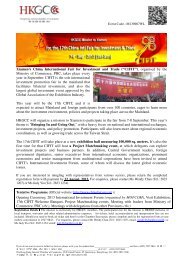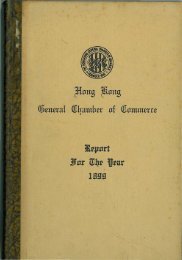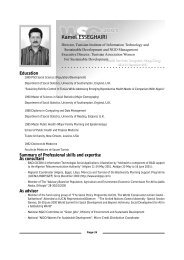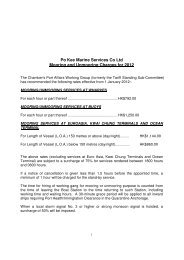é¦æ¸¯ç¸½åæå ¨ç¨çºæ¨ - The Hong Kong General Chamber of Commerce
é¦æ¸¯ç¸½åæå ¨ç¨çºæ¨ - The Hong Kong General Chamber of Commerce
é¦æ¸¯ç¸½åæå ¨ç¨çºæ¨ - The Hong Kong General Chamber of Commerce
Create successful ePaper yourself
Turn your PDF publications into a flip-book with our unique Google optimized e-Paper software.
| Health 健 康 生 活 |Happiness Is the Best Medicine快 樂 是 最 佳 良 藥Positive feelings may help protect cardiovascular health正 面 情 緒 或 有 助 保 障 心 血 管 健 康Over the last few decades numerous studies have shownnegative states, such as depression, anger, anxiety, andhostility, to be detrimental to cardiovascular health.Less is known about how positive psychological characteristicsare related to heart health. In the first and largest systematicreview on this topic to date, Harvard School <strong>of</strong> Public Health(HSPH) researchers found that positive psychological wellbeingappears to reduce the risk <strong>of</strong> heart attacks, strokes andother cardiovascular events.<strong>The</strong> American Heart Association reports more than 2,200Americans die <strong>of</strong> cardiovascular disease (CVD) each day, anaverage <strong>of</strong> one death every 39 seconds. Stroke accounts forabout one <strong>of</strong> every 18 U.S. deaths.“<strong>The</strong> absence <strong>of</strong> the negative is not the same thing as thepresence <strong>of</strong> the positive. We found that factors such as optimism,life satisfaction, and happiness are associated with reducedrisk <strong>of</strong> CVD regardless <strong>of</strong> such factors as a person’s age,socioeconomic status, smoking status, or body weight,” saidlead author Julia Boehm, research fellow in the Department <strong>of</strong>Society, Human Development, and Health at HSPH. “For example,the most optimistic individuals had an approximately50% reduced risk <strong>of</strong> experiencing an initial cardiovascularevent compared to their less optimistic peers,” she said.In a review <strong>of</strong> more than 200 studies published in two majorscientific databases, Boehm and senior author Laura Kubzansky,associate pr<strong>of</strong>essor <strong>of</strong> society, human development,and health at HSPH, found there are psychological assets, likeoptimism and positive emotion, that afford protection againstcardiovascular disease. It also appears that these factors slowthe progression <strong>of</strong> disease.To further understand how psychological well-being andCVD might be related, Boehm and Kubzansky also investigatedwell-being’s association with cardiovascular-related healthbehaviors and biological markers. <strong>The</strong>y found that individualswith a sense <strong>of</strong> well-being engaged in healthier behaviorssuch as exercising, eating a balanced diet, and getting sufficientsleep. In addition, greater well-being was related to better biologicalfunction, such as lower blood pressure, healthier lipid(blood fat) pr<strong>of</strong>iles, and normal body weight.If future research continues to indicate that higher levels<strong>of</strong> satisfaction, optimism, and happiness come before cardiovascularhealth, this has strong implications for the design <strong>of</strong>prevention and intervention strategies. “<strong>The</strong>se findings suggestthat an emphasis on bolstering psychological strengths ratherthan simply mitigating psychological deficits may improvecardiovascular health,” Kuzbansky said.過An emphasis on bolstering psychological strengths rather thansimply mitigating psychological deficits may improve cardiovascular health.改 善 心 血 管 健 康 的 重 點 是 提 升 心 理 質 素 , 而 非 單 單 緩 和 負 面 情 緒 。去 幾 十 年 , 眾 多 研 究 均 顯 示 憂 鬱 、 憤 怒 、 焦 慮 和 仇 恨 等 負 面狀 況 不 利 於 心 血 管 健 康 , 但 我 們 對 正 面 心 理 特 質 與 心 臟 健 康左 右 。」綜 合 兩 大 科 學 數 據 庫 發 表 的 逾 200 項 研 究 ,Boehm 與 同 系 副 教 授 及的 關 係 則 所 知 不 多 。 哈 佛 公 共 衞 生 學 院 就 這 個 題 目 進 行 了 迄 高 級 研 究 員 Laura Kubzansky 發 現 , 樂 觀 和 正 面 情 緒 這 些 心 理 條 件 可今 首 個 最 大 型 的 系 統 性 研 究 , 研 究 員 發 現 正 面 的 心 理 素 質 似 乎 可 降 低 罹患 心 臟 病 、 中 風 和 其 他 心 血 管 疾 病 的 風 險 。禦 心 血 管 疾 病 , 而 這 些 因 素 亦 似 乎 可 延 緩 疾 病 惡 化 。為 進 一 步 了 解 心 理 健 康 與 心 血 管 疾 病 的 關 係 ,Boehm 和 Kubzansky根 據 美 國 心 臟 協 會 的 報 告 , 每 日 有 超 過 2,200 名 美 國 人 死 於 心 血 管 疾 亦 探 討 了 正 面 的 心 理 與 心 血 管 相 關 的 健 康 行 為 和 生 理 指 標 之 間 的 關 係 。病 , 平 均 每 39 秒 就 有 一 人 死 亡 , 而 在 當 地 每 18 位 死 者 之 中 , 就 有 大 概 他 們 發 現 , 擁 有 正 面 情 緒 的 人 會 有 一 些 較 健 康 的 習 慣 , 如 做 運 動 、 飲 食一 人 死 於 中 風 。哈 佛 公 共 衞 生 學 院 社 會 、 人 類 發 展 及 健 康 系 研 究 員 Julia均 衡 和 睡 眠 充 足 等 。 此 外 , 心 理 愈 健 康 , 生 理 功 能 也 愈 佳 , 例 如 血 壓 較Boehm 低 、 擔 血 任 脂 水 平 較 健 康 及 體 重 正 常 。是 次 研 究 主 管 。 她 說 :「 沒 有 負 面 情 緒 並 不 等 同 擁 有 正 面 情 緒 。 我 們 發現 , 無 論 任 何 年 齡 、 社 會 經 濟 地 位 、 吸 煙 狀 況 或 體 重 的 人 士 , 只 要 保 持樂 觀 、 滿 足 和 快 樂 , 就 可 減 輕 患 上 心 血 管 疾 病 的 風 險 。」 她 續 說 :「 例如 , 最 樂 觀 的 人 罹 患 初 期 心 血 管 疾 病 的 風 險 , 比 相 對 悲 觀 的 人 士 低 50%假 如 未 來 的 研 究 持 續 顯 示 滿 足 感 、 樂 觀 和 快 樂 等 正 面 情 緒 能 帶 來 心血 管 健 康 , 這 對 於 制 訂 預 防 和 干 預 策 略 將 有 重 大 的 啟 發 作 用 。Kuzbansky表 示 :「 這 些 結 果 證 明 , 改 善 心 血 管 健 康 的 重 點 是 提 升 心 理 質 素 ,而 非 單 單 緩 和 負 面 情 緒 。」52 June 2012 <strong>The</strong> Bulletin 工 商 月 刊

















